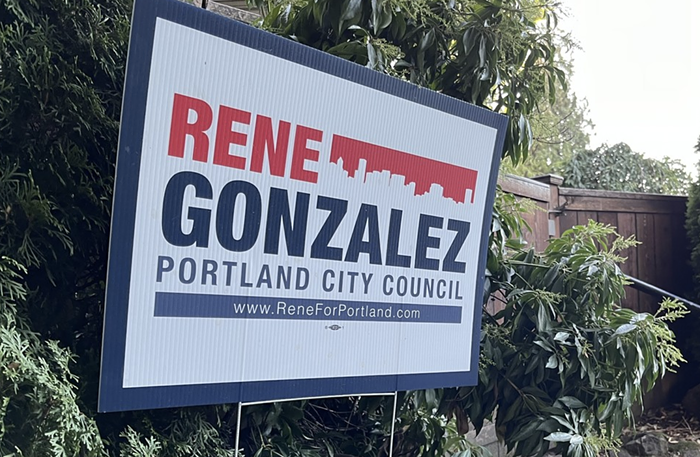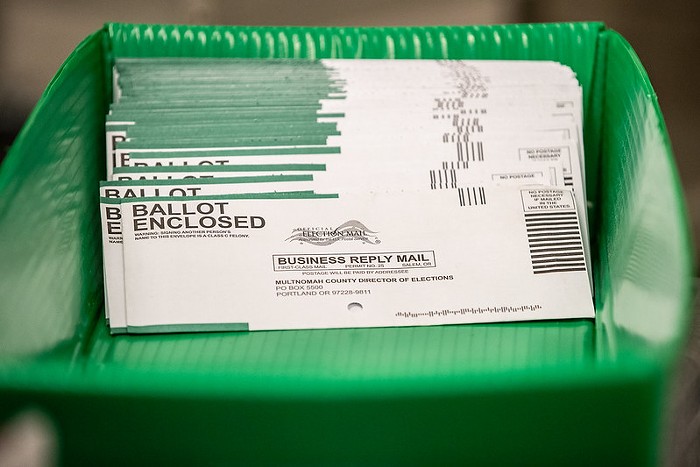An Oregon judge revoked a $77,140 fine given to city council candidate Rene Gonzalez’s campaign for alleged election law violations Thursday. The decision to overturn the fine heavily rested on expert testimony from a small number of real estate brokers who spoke to poor rental conditions in downtown Portland.
Gonzalez received a $77,140 fine from elections officials in September when an investigation by the city’s Small Donor Elections office found that the campaign was accepting deeply discounted rental space in downtown Portland from local businessman Jordan Schnitzer. The 3,185-square-foot office was listed at $6,900 per month, but Gonzalez’s campaign was renting the office for $250 per month, plus $540 in monthly utilities.
Gonzalez—who is challenging incumbent City Commissioner Jo Ann Hardesty—is enrolled in the Small Donor Elections program, which limits candidates from receiving donations exceeding $250. Susan Mottet, the director of the program, characterized the discounted rent as an in-kind donation because Gonzalez was receiving the office space for less than fair market value, which Mottet assessed at $6,900. Mottet fined Gonzalez’s campaign $43,890 to be paid to the city and $33,250 to be paid to Schnitzer to return the “in-kind contribution.”
Gonzalez’s campaign appealed the fine, arguing that the $250 rent was fair market value because of the current conditions of downtown Portland.
"Landlords are desperate to get any kind of compensation for their space because of the city's failures to address crime and homelessness has made downtown inhospitable to tenants, landlords and visitors,” Gonzalez’s campaign said in a statement.
Administrative Judge Joe Allen agreed with Gonzalez’s campaign, ruling that they were being charged fair market rate for the office space due to the undesirable nature of the ground-floor office building, and the fact that the campaign was renting on a month-to-month basis. Gonzalez’s campaign could be given 30-days notice to move out if the property owner found long-term renters to fill the space at its listed price.
Allen’s opinion was based on testimony provided from local and regional commercial real estate brokers who spoke to rental conditions in downtown Portland. One of the brokers who spoke to conditions downtown, Patrick Gilligan of Lincoln Property Company, contributed $250 to Gonzalez’s campaign in October. The only broker called by the city to testify in the case, Hope Beraka of Think Real Estate, contributed $250 to Hardesty’s campaign in June. It's unclear whether the other brokers called as experts by Gonzalez’s campaign—Nathan Sasaki of Apex Real Estate Partners and Brandon Anderson of Pivot Property Management—have ties to either candidate.
“According to the overwhelming weight of expert testimony, the current state of the commercial real estate market–particularly ground-floor retail and office space–in downtown Portland is weak due to repeated civil unrest, increased homelessness, vagrancy, as well as both personal and property crimes,” Allen wrote.
The opinion also notes that the city did not provide enough evidence that the fair market value of the office is $6,900— even though that’s the price Schnitzer is currently listing the office for online, and the price which the elections fine was based on. According to the brokers testifying on behalf of Gonzalez, the listed rental price is a starting point for negotiations between the owner and renter, so it was inappropriate for Portland elections officials to use the listed price as the fair market value.
Allen also determined that Mottet did not consider that the Gonzalez campaign was renting on a short-term basis and was tasked with paying for any property damage that occurred while the campaign was in the office, like vandalized or smashed windows that would have been the owner’s responsibility if the office was vacant. According to Gonzalez’s campaign, the office windows were smashed and equipment was stolen from the campaign office during the summer.
Gonzalez celebrated the decision, but argued that harm to his campaign’s reputation is hard to reverse.
“While we are pleased with the decision, the damage to the campaign has been done,” Gonzalez said in a press statement. “We also look forward to a comprehensive examination and review of the process that led us here and to ensuring this never happens again to another campaign.”
The Portland Elections Commission, a volunteer board that oversees the Small Donor Elections program, disagreed with the judge’s ruling, calling Allen’s evaluation of fair market price for the downtown office space “subjective.”
“I am stunned by this decision,” said Portland Elections Commission Chair Amy Sample Ward. “This ruling creates a loophole for donors to give enormous in-kind contributions, rendering useless the contribution limits in the program and penalizing those who play fair.”
Sample Ward said that the city should consider amending the Small Donor Elections program rules to stop similar rental agreements from happening in the future.




















